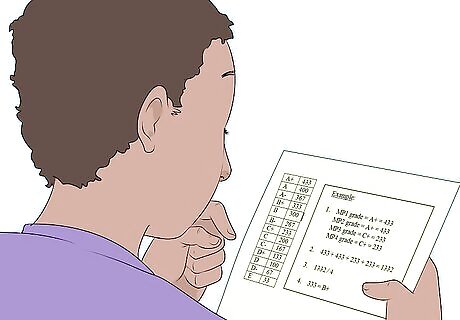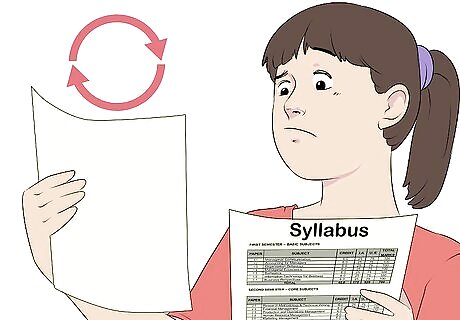
views
Making Sense of the Grade You Earned

Understand the grading process. Grading can vary wildly, depending on the subject, college, teacher, and the country you are in. However, a good quality program will have standards that both staff and students adhere to. The professors access the quality of your work based on certain criteria, which should be made clear at the beginning of the course. This does not mean that no appeal is possible, but by and large your responsibility is to meet the standard. Unless the professor made a glaring error while grading your assignment or determining your course grade, they are unlikely to change your grade. It is also important to remember that grades are earned, not given. You do not earn a grade based on how hard you work, but rather how well you have mastered the material and followed the guidelines for the assignments. Unfortunately, you do not get bonus points for effort.

Decide if it’s worth your time and energy. In most cases, it is not worth your time or energy to attempt to get a professor to change your grade. The process will suck up valuable time, which can be better spent on future assignments and your other coursework. Before approaching your professor, think about whether it is worth the hassle.

Review the course syllabus. It’s important that you go over the course syllabus in detail before approaching your professor about the grade you earned. Carefully read every word of the syllabus, paying specific attention to the sections on assignments and how your grade is calculated. For example, if you turned in the assignment late, you should consult the syllabus about the professor’s late assignment policy. This might explain why you earned a particular grade. This will also indicate to your professor that you read instructions and are thorough. You don't look great when the answer to your question is in bold in the syllabus!

Make sure you followed the assignment instructions. Before you approach a professor about changing your grade, you need to make sure you followed instructions for the assignment in question. Look over the assignment instructions and carefully consider each part of them. Not following instructions is often the reason you did not earn the grade you expected. For example, if the assignment instructions say to turn in a 5-page paper and you only turned in 2 pages, it might explain your grade.

Carefully read the professor’s comments. Before you freak out over a grade, you should carefully read all of the comments that the professor included on the assignment. In most cases, these comments will tell you why you earned a particular grade. If you have trouble reading or understanding your professor’s comments, try asking them to clarify.
Talking to Your Professor about Your Grade
Check the accuracy of the professor's grading, if applicable. Education is often an imperfect art; professors sometimes make mistakes in grading. Sometimes the wrong answer key was used, or the professor misunderstood your thesis, the teacher was up at 4 a.m. grading papers or any number of errors. Justifying a higher grade needs data, and that often means proving the professor was in error. Check your answers with peers, on the Internet, or with other sources. If comments on a written piece do not make sense, there is the possibility of the professor misreading something.(Although it is possible your writing is problematic, not an error on the part of the professor.) If you do not understand the corrections or mistakes, it is often worth contacting the professor in order to go over the work. Depending on the school, class, or teacher, you may not be able to get the grade changed. However going to the professor with a good attitude will often make a professor more likely to work with you in improving your grade.

Set up an appointment to speak with your professor. In many countries, there are laws that forbid professors from discussing grades via email. Instead of attempting to have a conversation about your grade over email, set up an appointment to talk to your professor face-to-face. Try talking to your professor after class. You can say, “Dr. Johnson, I am concerned about the grade I earned on the exam. Can we set up a time to meet?” Note that many professors will require you to wait at least 24 hours after receiving a grade to discuss it with them. This encourages students to review the material carefully during that time rather than reacting harshly or in a hostile manner after receiving a poor grade. Even if email is an option, face-to-face meetings are generally best in discussing this sort of issue.

Be ready to submit a written rebuttal. If you decide to proceed with challenging your grade, most professors will make you submit your objections in writing. You will need to outline why your assignment deserves a higher grade, and how the evidence you submitted in the assignment fulfilled the professor’s guidelines. It is also helpful to incorporate the professor’s comments on your assignment into the written rebuttal.

Be respectful and professional at all times. You should always act with courtesy toward your professors, even if you disagree with them. Being aggressive or confrontational is not acceptable, and can land you in a heap of trouble. Always speak to your professor with respect, act like a professional and never ever threaten a professor. You’re more likely to be persuasive and successful in getting your professor to change your grade if you discuss your objections respectfully.

Ask the professor to clarify their comments. In many cases, you can clear up a misunderstanding over your grade by asking the professor to explain their comments in more detail. This gives the professor a chance to talk at length about their comments and will help you understand why you earned the grade. Try saying, "Dr. Smith, I’m confused by what you meant in your comment about my lack of organization. Can you explain this to me?" You may also want to ask your professor for advice on improving areas that they determined were sub-par.

Emphasize your desire to improve. It’s important that your professor understands you want to improve your performance in the course. During your meeting ask the professor to give you suggestions on how to improve on future assignments. Try saying, “I’m really committed to improving my grade in this course. How can I do better on the next assignment?” You can say, “Dr. Anderson, I am dedicated to improving my grade in this course. What are some specific actions I can take to improve my grade?” Lead with your desire to improve, rather than your desire to change your grade, is more likely to persuade your professor.
Suggesting Possible Solutions

Ask for extra credit. Sometimes you can raise your grade in a class by doing extra credit. You can try asking your professor for an additional paper or assignment to earn extra points. Keep in mind that many professors, however, do not offer extra credit. Consider asking, "Dr. Toothman, do you offer extra credit? Perhaps I could write another paper to earn some extra points."

Inquire about re-doing the assignment. This can be a feasible solution if your professor is open to the idea. Ask the professor if you can take a second shot at the assignment. For example, you can ask to write a new paper on the same or a similar topic. You could say, “Mrs. Alderman, would you allow me to retake the exam?”

Reconsider taking it to a higher level. You should think carefully before appealing your grade at a higher level. Unless the professor made a clear mistake, those above them will support the original grade. If you truly believe you can make a strong case for a grade change, make sure you follow the appropriate chain of command. Ask your university’s office of student affairs about the proper procedure.

Let it go. Unless the professor made an obvious mistake while calculating your grade, it is in your best interest to let it go. Pursuing an unwarranted grade change will not put you in a favorable light with the professor. More importantly, the effort you spend pursuing a grade change can be better spent on studying.














Comments
0 comment